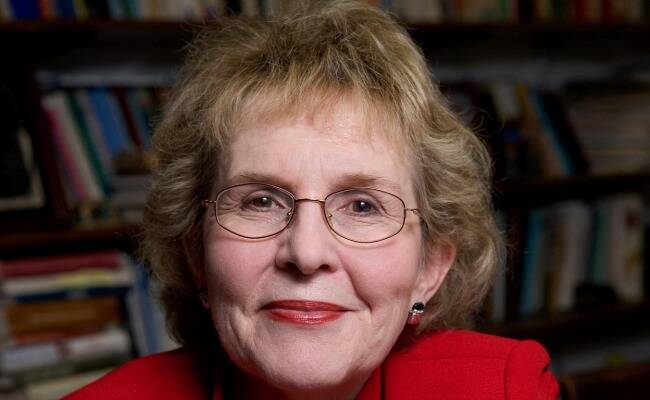The night before they died I had spent time watching the night sky to spot the Perseid meteor showers, scanning the constellation Perseus for falling stars. The next day I learned of the death of two stars of church and academia, Brother Jeffrey Gros, F.S.C., an ecumenist and theologian, a much loved and universally admired former staffer at the USCC Secretariat for Ecumenical and Interreligious Affairs, and the University of Chicago political theorist and ethicist Jean Bethke Elshtain, known for her use of the classics of western civilization to illuminate the ailments of today’s world.
Prior to coming to the National Conference of Catholic Bishops, the then pastoral division of the United States bishops’ conference, Brother Jeff had served for ten years as director of the U.S. office of Faith and Order Commission, an ecumenical assembly within the World Council of Churches. I met Jeff when I head the Office of International Justice and Peace at the USCC. We engaged early in my tenure in achieving accords on issues of proselytism with World Vision and other Evangelical and Protestant groups in Latin America.
Jeff, who had edited two collections on the peace churches, advised me when I was invited to join the International Mennonite-Catholic Dialogue and through a host of joint efforts with the National Council of Churches and collaboration with other denominations. When he retired from the conference some years after I had gone to America, he travelled throughout Latin America to study the reception of Vatican II there, especially in the areas of ecumenism and religious liberty. In the course of his work, he gained an encyclopedic knowledge of the history and present trends in contemporary Latin American theology.
Jeff with his irenic style was always producing agreement where others might only bog down with intransigence. Jeff represented the best in the La Salle Christian Brothers’ charism, hard work, sprawling competence, quiet goodness, bound together with a low-key, humble style. When he invited me to offer two lectures for the inauguration of his chair at Memphis Theological Seminary, I witnessed him leading a colloquium of very diverse older students on Latin American church history in an easy, inviting way.
As a confidant, mentor and exemplary religious, Jeff Gros will be sorely missed. But his memory, like a star, will illuminate our nights.
Jean Elshtain was clearly a star in the American intellectual firmament. She was distinctive for bringing the classics of western thought to bear on contemporary problems. While others might use a few narrow principles from Locke, Bentham, Mill or Rawls to address today’s ethical problems, at a time when “the canon” was under attack, she was not afraid to appeal to Plato, Augustine and Aquinas as well, providing a depth undetectable in less learned thinkers. When public theology was in eclipse before the advance of secular philosophy, she would build arguments on themes from Luther, Calvin, Niebuhr and John Paul II. Universities vied for her presence. For one short period, I believe, she was simultaneously on the faculties of Vanderbilt, Chicago and Georgetown.
I first encountered Jean’s name as a "conservative feminist," whose understanding of emancipation had a social as well as an individual meaning. Liberated women, she argued, should use their freedom to give voice to the needs of those marginalized by corporate society: the unborn, children and families (Public Man, Private Woman, 1981). Given the social quality of her thought, I once asked her what was her underlying theological anthropology. She appealed often to the Thomistic idea of society, so I presumed she would say, “Thomas.” “No,” she said, “Luther.” At that time, she was still a believing Lutheran; but according to a Commonweal blog (Aug. 13) she died a Catholic.
Elshtain’s study of John Paul II may have had a lot to do with her entrance into the Catholic family. His realism had much in common with Luther’s pessimism, and his prophetic attitude toward the world and his denunciations of the culture of death seemed to Jean a better way to address our fallen world than Thomistic and Vatican II optimism. Like her admiration of John Paul II, her attraction to Albert Camus, whom she also celebrated in Who Are We? (2000), may have grown out of the same sensibility for the difficulty of doing good in an evil world.
As I left Notre Dame in 1990, with George Lopez I inaugurated a three year program for an updating of just-war thinking. We invited Jean to participate, and she later told me, “I owe my renewed interest in Just War to you.” For that reason, I regret it was differences over the 2003 Iraq War that divided us. In Just War Against Terror (2003) she offered a defense of the Bush Administration’s invasion of Iraq and the war on terror. In an America review essay, “An Empire in the Name of Peace” (Sept. 15, 2003), I drew on her own Augustine and the Limits of Politics (1996) to critique her rationalization of President Bush’s war. Some years later, when I rose to ask a question at a Fordham University forum, she spent her answer time replying to the review some years before.
I regret very much that is my last personal recollection of Jean. For she was a great mind with a big heart, and she remains a model of the Christian intellectual engaging with the modern world. A bright star has fallen from the sky.








